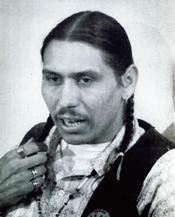Obituary for Carter Camp
Ponca City Now - January 2, 2014 12:00 am

“The greatest of us has gone on ahead now…” began the open letter to our family from our Wazhazhe brother, Carter Revard, Poet Laureate for the Osage Nation.
Carter Augustus Camp began his final journey late Friday afternoon, December 27th, 2013. The son of Woodrow Howard Camp and Jewell Faye McDonald Camp, a descendant of the McDonald & Yellowberry families, Carter was born the summer of 1941 at the Pawnee Indian Hospital, Pawnee OK., the 3rd of 6 children. He graduated from Haskell Institute, now Haskell University, in 1959. Excellent in sports, Carter’s basketball team lost in the Kansas State Finals, an experience never forgotten. Shortly after leaving Haskell Carter enlisted in the U.S. Army serving a tour in Western Europe. After his discharge he relocated with the family to work in Los Angeles and played basketball for the American Indian Athletic Association on weekends. Following his father’s philosophy of staunch unionism, at his place of employment Carter began representing fellow workers as the shop steward and was then elected Business Agent for the International Brotherhood of Electrical Workers. Coming of age in the turbulent 1960’s when racism was rampant and the U.S. President and other great leaders were murdered, Carter thus began his lifelong passion as a champion for social change and specifically for his beloved Native People. In 1970, back home in Oklahoma, Carter worked for change in the way federal funds were distributed in the Oklahoma school system meeting with school and tribal officials. Shortly thereafter the Johnson-O’Malley monies that were earmarked for native children began to be used the way they were intended, an auspicious beginning and brought notice to friend and foe alike. Carter joined the still fledgling American Indian Movement [AIM} during this period and soon after organized the first AIM chapters in Oklahoma and Kansas. The Trail of Broken Treaties was a nationwide protest in the form of a caravan of native activists traveling from the west coast to Washington D.C. with many stops in between. The huge Oklahoma/Kansas contingent, over 20 carloads, was a reflection both of Carter’s organizing skills and the readiness of the native people to help bring about positive change beginning with a review of native treaty’s with the U.S government. During the eventful caravan trip, Carter and Hank Adams, President of The National Council of Churches, co-authored the groundbreaking “Twenty Points” summation document to present to Government officials in Washington. The Nixon officials chose not to meet with AIM leaders resulting in a 3 day takeover of the BIA building ending only with government concessions made including future treaty negotiations. At this time, Native rights violations, civil and legal were commonplace throughout the United States with South Dakota leading the way in police brutality and inhumane treatment. With the massacre of hundreds of innocent women and children at Wounded Knee (WK), S.D. in 1890, it was a historically appropriate site for the American Indian Movement to bring national attention to the struggles of the Lakota and all Native peoples. There was a great meeting of all the Lakota chiefs with the exception of one who sent a relative. There it was decided to invite the American Indian Movement as a last desperate call for help. The ensuing 71 day occupation of WK served as a rallying call and was heeded throughout the nation with carloads of Native people being arrested as far as 500 miles distant. Carter Camp was given the honor of leading the first wave of warriors into Wounded Knee, securing communications and making safe the entry of the caravan of activists. “Finally I bent over and picked a sprig of sage…I looked for BigFoot and YellowBird in the darkness and I said aloud ‘We are back my relations, We are home, Hoka Hey’” – Carter Camp. Native scholars and activists call this WK a benchmark in the struggle for Native sovereignty. After Wounded Knee in White Oak, OK the last great national gathering of AIM took place. Carter was elected the national chairman by acclamation. From that time until the present he has continued the fight to protect the remnants of sovereignty that we still enjoy, with protecting the Mother Earth foremost.
Carter was preceded in death by his parents and sister Darlena Overland. He is survived by his wife Linda Carson Camp and sons Kenny, Jeremy, Victorio, Mazhonaposhe, and Augustus. Also sister Casey Camp-Horinek and brothers Craig and Dwain Camp. Carter also leaves behind numerous nieces and nephews, a large extended family and inumerable friends from across the nation. Casket Bearers will be; Kenny Camp, Jeremy Reed, Victorio Camp, Mazhonaposhe, Ahmbaska Camp, Augustus Camp, and Frank Carson. The traditional noon feast will be served at the Ponca Nation Cultural Center to be followed by services and internment at the Ponca Nation, cemetery up on the hill.
Source: Trout Funeral Home
